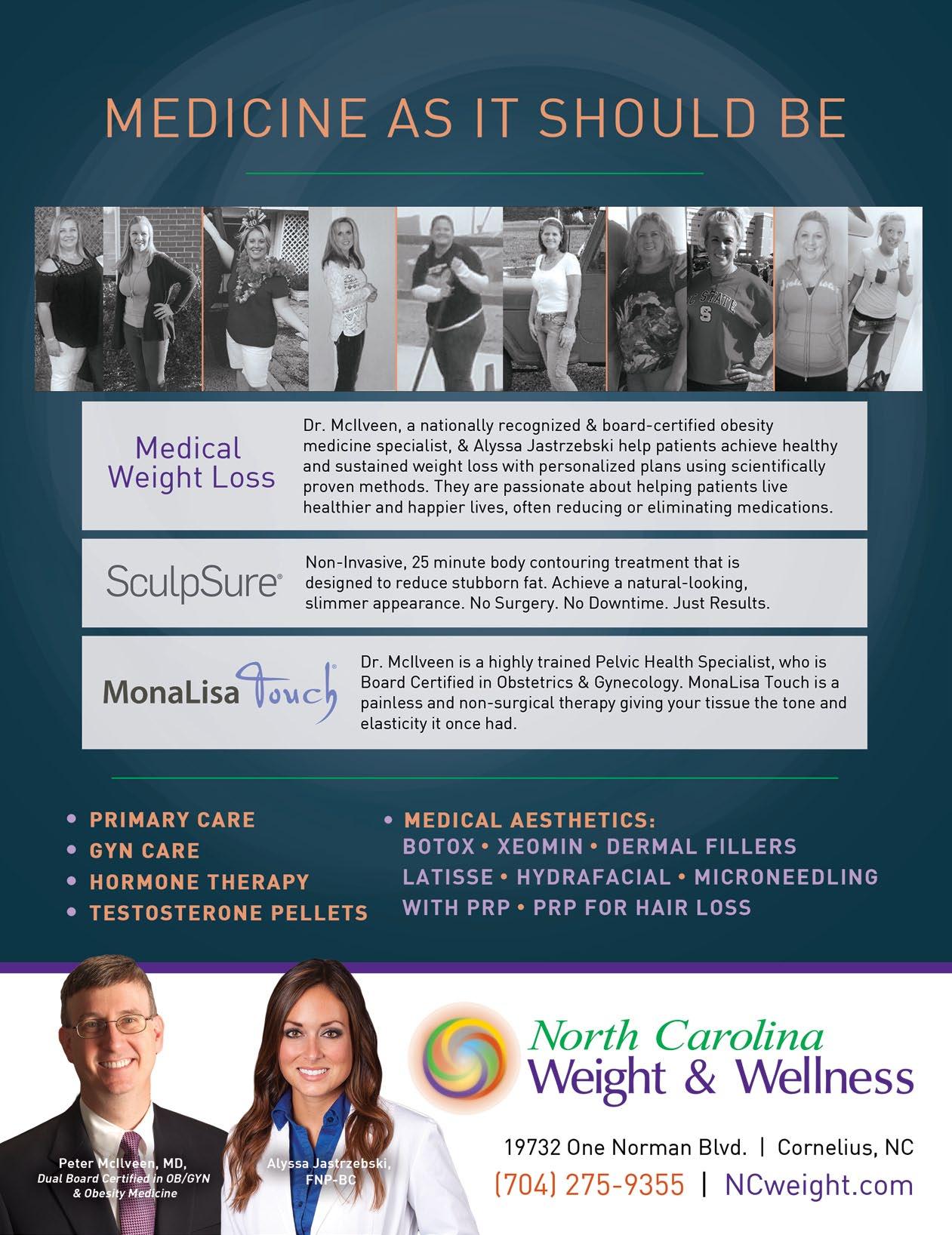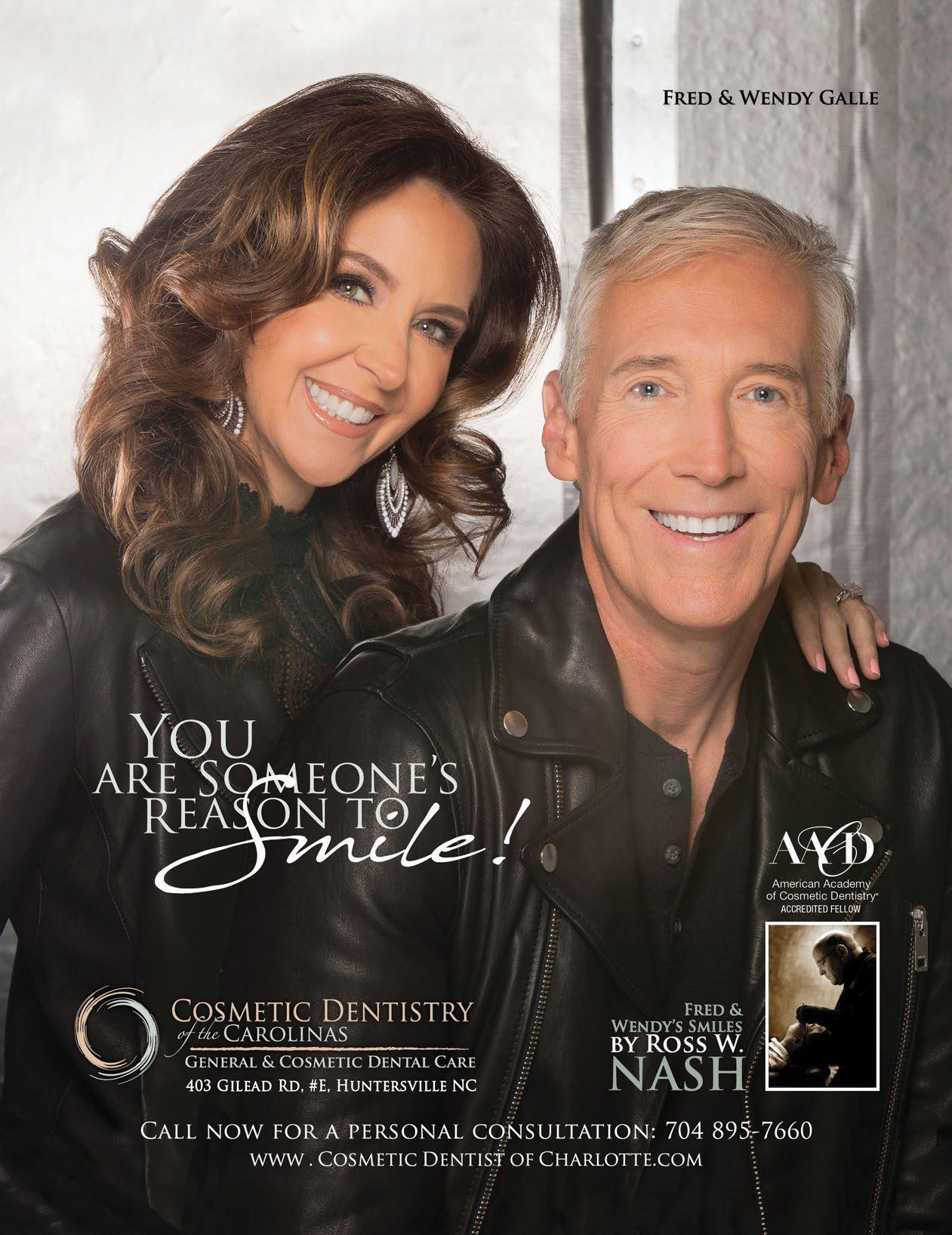
5 minute read
How Wise Are You About Wisdom Teeth?
A Carolina Oral Q&A
As ora l s ur geons , one of the most common questions that we get is, “Why do we have wisdom teeth if they need to be taken out?” While there are several theories proposed for the presence of wisdom teeth, no one particular theory has been proven. What we do know is that their presence, whether impacted or erupted into the mouth, presents an oral health problem. Here are some other common questions regarding wisdom teeth:
Advertisement
l k n e x p e r t
Dr. Michael Foran is an oral/maxillofacial surgeon and partner at Carolina Oral & Facial Surgery (as well as Lake Norman Implant Dentistry), located at 19910 North Cove Road in Cornelius. You may reach them at 704.892.1198 or visit them at www.CarolinaOMS.com.
What is the main concern with wisdom teeth? Impacted wisdom teeth create a pocket that bacteria can live in and cannot be effectively cleaned out. When these bacteria multiply, their byproducts destroy the surrounding bone and soft tissue and can damage the adjacent molars and supporting tissues. It can also cause cavities in hard-to-reach places that may not be fixable and cause the loss of those adjacent teeth. Additionally, impacted teeth can have different cysts and tumors form, which need to be removed. Even when wisdom teeth erupt into the mouth, rarely can they be maintained or kept clean, resulting in similar issues. Q:
When should wisdom teeth be removed? As a general rule, the best time to remove wisdom teeth is between the ages of 14 and 20. Everyone in this age group should have a full mouth x-ray or 3D cone beam CT to check the positioning of their wisdom teeth so a more individual plan can be formulated. Waiting until the late 20s, 30s, or 40s generally makes the removal much more difficult and increases Q:
the risks for complications and longer, slower recovery periods.
How much recovery time is involved? When patients have their wisdom teeth removed, they should remember that it is a surgical procedure. It involves having anesthesia, surgical removal of small amounts of surrounding bone and the teeth, and a recovery period. Some patients feel great the next day, while others may take several days to recover. During this time patients should limit their activities at home, especially athletics, and stick to a softer diet. Q:
What should I expect post-surgery? Syringes are given to patients to care for and clean the extraction sites. Sometimes patients may be slow to heal or have pain that continues beyond a few days. This is generally referred to as “dry socket.” While dry socket is not dangerous, it can be uncomfortable and refractory to oral pain medications. In these cases, patients can see their surgeon to have medicine placed directly into the extraction sites to ease the discomfort. w Q:

Mind better me … better yo u … better wor ld body spirit

By mixing the ingredients of attitude and action, we can change the flavor of our own lives. Learn to nurture your body and soul to lead a more balanced life.
a d a p t a t i o n o f Deepak Chopra’s 6 pillars of health
We know, we know. You’re too busy caring about other people to take care of yourself.
You know, you know. If you’d take better care of yourself, you’d take better care of your loved ones.
These common phrases are like a merry-go-round, circling with jangly music and lurid color. They’re loud and demanding, and they’re not actually taking you anywhere. If you were able to take better care of yourself, you’d already be doing it, right? But you’re so busy tending to your family, or your students, or your animals, you can’t wedge any self-care into your schedule. And around you spin.
Reading an article about mind-body-spirit guru Deepak Chopra’s speech to the American Academy of Family Physicians made the jangle-go-round come to a halt, for me. In Deepak’s words, the painted horses of the self-care cycle are sleep, meditation, movement, emotion, nutrition, and biorhythms, or fluctuating energy cycles. In order to live a balanced life, to be at our best for our self and others, we need to tune in to each of these elements. “The body is literally the metabolism of experience,” Deepak says. “Bodies are a process, not a structure.”
By pulling out the individual elements of self-care, then stating that they move each other forward, Deepak helped me see that each horse on the ride has its own position and purpose. To turn life’s whirling from stress to fun, we want to make sure we sit on each horse.
“Everything we do,” Deepak said, “influences our health because our actions, moods, thoughts, sleep and more affect gene expression.” Reading his philosophy, one can feel the guilty pressure of their Should-Dos—eat your veggies, go to the gym, get enough sleep—fade away, replaced by a curious interest. What would happen if I did meditate regularly? How would regular workouts affect my mood? Some say you catch more flies with honey than with vinegar. I say you do better self-care with curiosity than with pressure.
Which of Deepak’s elements are most appealing to you: more sleep? Meditation? Movement? Awareness of your emotions? Cleaner eating? Tuning in to your shifting energy levels? Over the next week, give ten minutes a day to that practice. And notice if the rest of your life is affected. Dollars to donuts you’ll feel like your days—and those of the family, friends, and furries who love you—are spinning smoother. w
Cyndy Etler is a board-certified teen life coach and award-winning young adult memoir author. Her work has been featured on CNN, NPR, CBS’ The Doctors, Huffpost, Today’s Parent, and other international media.












